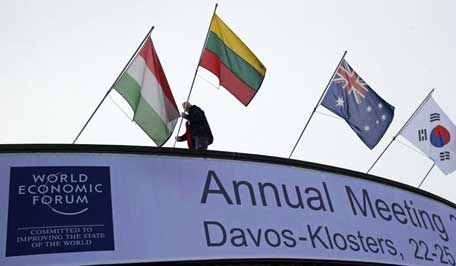Political and financial elites look forward to Davos Forum

 0 Comment(s)
0 Comment(s) Print
Print E-mail CNTV, January 22, 2014
E-mail CNTV, January 22, 2014
Political and financial elites around the world will meet for their annual gathering at the Swiss ski resort town Davos. Several political leaders are expected to deliver speeches and talks that will focus on the future of the world economy.
The rich and powerful have been coming to the Swiss resort of Davos since 1971. But this year’s World Economic Forum is focussing on the future not the past, says Forum Founder Klaus Schwab.
"If we look at the programmes of the last few years, they have been overshadowed by crisis. It was last year in particular the euro crisis, now it’s time to look at the real fundamental changes which are happening in the world, the technology area, the societal field and so on and to pay much more attention to those challenges which we have to face," said Klaus Schwab, founder of World Economic Forum.
The security challenges are great. Presidents and Prime Ministers from Japan, South Korea and Mexico, along with the UK, Nigeria and Ukraine, are all giving speeches. And there’s even the possibility of Israel and Iran’s leaders coming face to face.
President Hassan Rouhani is courting business after winning an easing of Iran’s economic sanctions.
The leaders who aren’t here also tell a story. Brazil’s President will be the only BRIC representative. And there’s good reason for that says the man who invented the acronym - former Goldman Sachs’ Chairman Jim O’Neill.
"Investors fell out of love with the BRIC countries two-three years ago, and the next tier of which most of the MINT countries are part of became quite popular and have done rather well until the past six months. To me a lot of these countries are very attractive to anybody who can think beyond the next five seconds," he said.
But it’s not all about emerging economies. IHS’s Chief Economist predicts good fortune for the U.S, UK, Germany and Japan.
"The emerging markets are slowing just as the developed world is accelerating. In a sense that’s good news because you’ve got this sort of rotation in growth and it’s not occurring at a bad time and in fact the advanced economies will help the emerging world a little bit this year because they’ll provide some markets for exports for the emerging world," he said.
The leaders of Germany, France and Spain are also absent this year - for various reasons. But that could be seen as a good sign - the euro zone is no longer centre stage.





